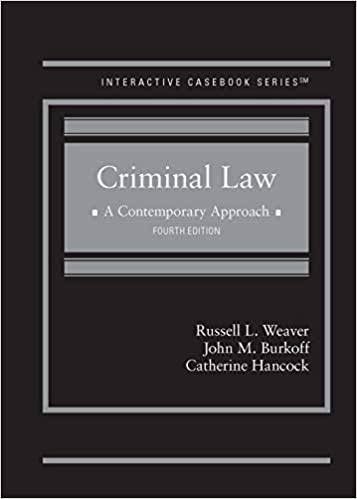Question
Martin, an Australian fruit juice merchant, arranged for shipments of Australian apple juice to be sent to Seoul, South Korea; orange juice to Taipei, Taiwan;
Martin, an Australian fruit juice merchant, arranged for shipments of Australian apple juice to be sent to Seoul, South Korea; orange juice to Taipei, Taiwan; and New Zealand grape juice to be supplied from Auckland, New Zealand to Hong Kong. Martin negotiated free in and out carriage contracts with The Freedom Carrier Co, the owners of the m.v. Suez, that were subject to Australian Law and Jurisdiction and allowed for transshipment on the most favourable conditions possible. The m.v. Suez arrived in Perth with a cargo of Australian apple juice. With the terms "weight and quantity unknown," the consignment was awarded a clean bill of lading. Later, it was noticed that the marks on the apple juice cases on the invoice and the bill of lading were different. The orange and apple juices were put onto the m.v. Suez in Auckland. The lack of accountability for third-party wrongful acts was a result of the clean bills of lading issued for these items. Careless stevedores ruined several crates of Australian apple juice by drinking the contents of a few stray bottles that fell out of the broken boxes as the new cargo was being loaded at Auckland. Due to inadequate stowage, many cases of orange juice came away from their ties and smashed on the way to Seoul. Freedom Carrier Co provided bills of lading to Martin for the three cargoes from their Canberra office, subject to Australian law and Canberra arbitration. Australia has ratified the Hague Visby Rules. The bill of lading for Australian apple juice covers the shipping from Perth to Seoul. Despite the fact that New Zealand is a signatory to the Hague Rules, the Hague Rules were not included in the bills of lading for orange and grape juice exports from Auckland to Taipei. The apple juice was purchased by Carlos, the orange juice was purchased by Davis, and the grape juice was purchased by Vaz. Each bidder paid Martin for the endorsement of papers for their various cargoes. After that, the m.v. Suez sailed to Seoul to discharge the Australian apple juice before heading to Taipei to discharge the orange juice and transship the grape juice onto the m.v. Bogata, which was bound for Hong Kong. The owners of the m.v. Bogata, Espirit Co, produced a bill of lading that was subject to Taiwanese law and jurisdiction and excluded culpability for damage caused by the vessel's unseaworthiness. It further stipulated that all cargo loss or damage claims must be filed within three months of the incident that caused the loss. The m.v. Bogata, which was evidently unseaworthy, began to float in heavy seas during the voyage from Taipei to Hong Kong, and the master ordered the cargo of grape juice to be dumped overboard in try to preserve the ship. The ship arrived in Hong Kong three months and a half later.
In light of the circumstances detailed above, discuss Carlos, Davis, and Vaz of their rights and obligations, with a focus on the Hague and the Hague Visby Rules.
Step by Step Solution
There are 3 Steps involved in it
Step: 1

Get Instant Access to Expert-Tailored Solutions
See step-by-step solutions with expert insights and AI powered tools for academic success
Step: 2

Step: 3

Ace Your Homework with AI
Get the answers you need in no time with our AI-driven, step-by-step assistance
Get Started


